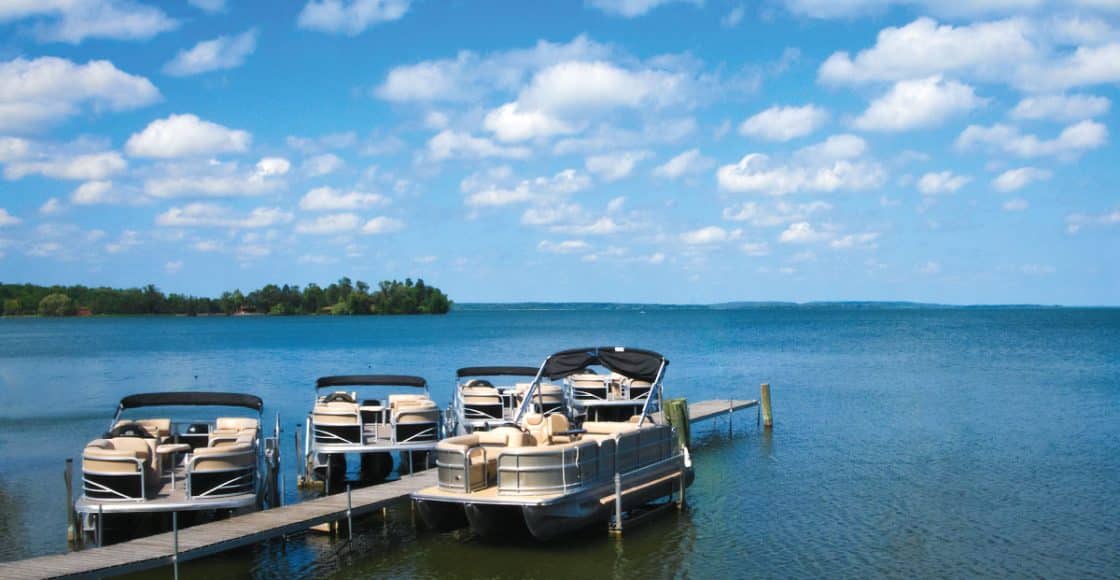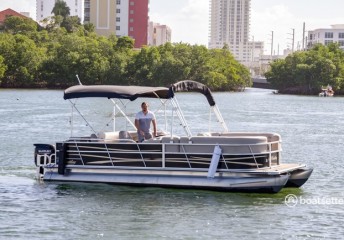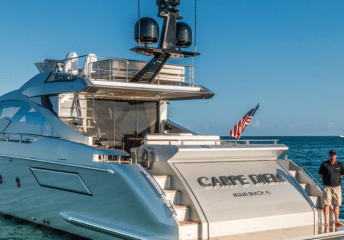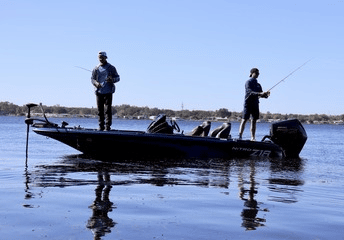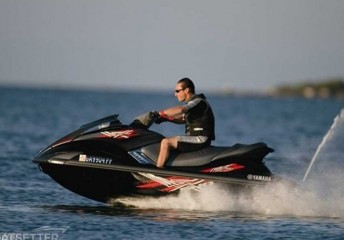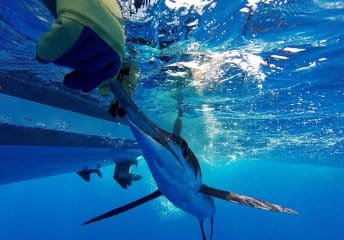Tritoon vs. Pontoon: What Are the Differences?
Last Updated on June 16, 2023 by Boatsetter Team
Tritoon and pontoon boats are both quite popular, but just what is the difference between the two? In a nutshell, common pontoon boats have two “logs” (the pontoon hulls themselves, which the deck sits on top of), while a tritoon has a third log running down the middle. But as accurate as this may be, and as simple as it seems at first glance, there’s more to the story.
Post summary:
- Performance
- Seakeeping abilities
- Construction
- Cost
List your boat & start earning an avg. of $20K yearly with Boatsetter
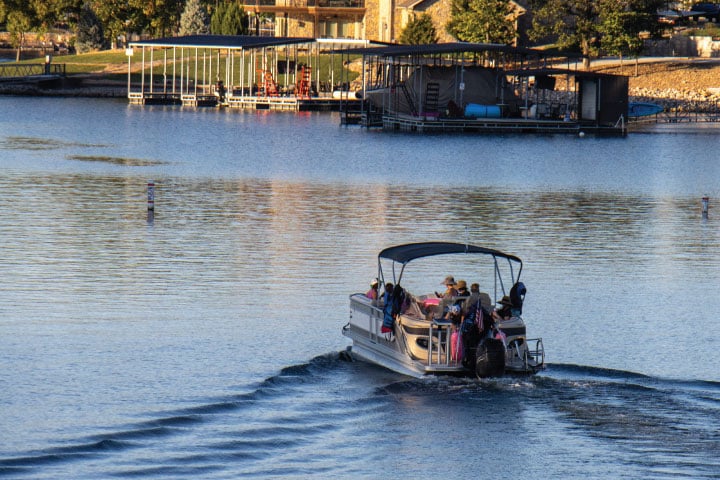
Tritoon vs. pontoon performance
One of the big differences between a tritoon and a pontoon is performance, which is in part due to the additional planning surface, buoyancy, and structural strength that are gained with a third log.
Thanks to enhancing these characteristics, the boat manufacturers can raise the maximum horsepower rating, and it’s not uncommon to see tritoon boats offered with a maximum horsepower rating 25% to 30% higher than on the same model with two logs.
That means a pontoon boat may max out at 200 or 225 horses, while an identical model tritoon might take 300 horsepower — and naturally, it’ll go a whole lot faster.
Many tritoons not only go faster than their pontoon counterparts but also handle better. The center log is often mounted slightly lower than the outer logs, which allows the boat to bank into turns more or less as a V-hull boat would.
Tritoons also may gain from added-on performance features like under-deck skins, welded-on lifting chines, and full-length keels. These can be added to pontoons as well, but since they increase cost, are often reserved for higher-end models. And most of the time, that means they’re tritoons.
We should note that in some cases, pontoon boat builders will offer a partial center log which starts at the bow but only goes back halfway or two-thirds of the boat’s length. This provides some of the benefits of a tritoon without quite as big a jump in cost.

Tritoon vs. pontoon seakeeping abilities
The added center tube improves the seakeeping abilities of a ‘toon quite a bit. The added buoyancy helps the bow rise up with waves rather than being overwashed and also mitigates the effects of a heavy load.
In fact, the weight-bearing ability is another factor where you’ll see significant quantifiable differences between pontoons and tritoons.
On a 22-foot model pontoon boat that’s rated to accommodate up to 10 passengers, for example, the tritoon version might have a maximum capacity of 12 passengers and an additional 300 to 500 pounds of weight.
Stability also gets a boost when you have a third log, because the buoyancy and centered weight reduce rocking and rolling when the waves kick up.
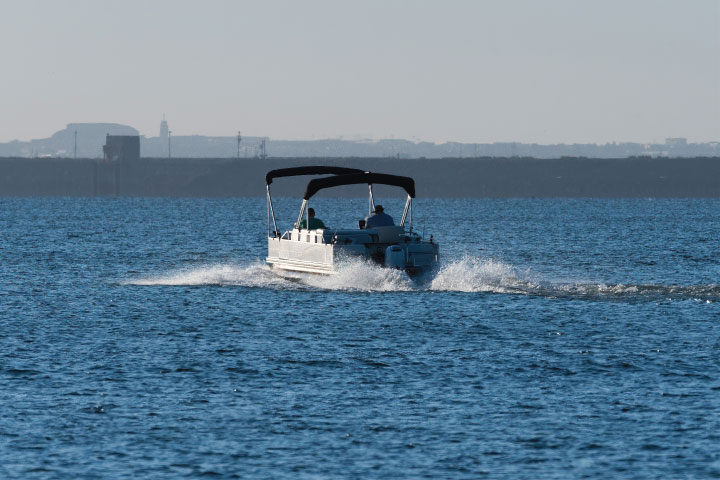
Tritoon vs. pontoon construction
As a rule, tritoons are built stronger than pontoons. Part of this is simply a matter of the structural enhancement gained by having a third rigid construction component, the log itself, running down the middle of the boat, which boosts the structure’s rigidity.
Along with that, however, since tritoons tend to be higher-end models and commonly have larger outboards, many manufacturers do build them to a higher standard.
Some mount the brackets attaching the logs to the deck with closer spacing or add special nose cones to the logs used on tritoon models.
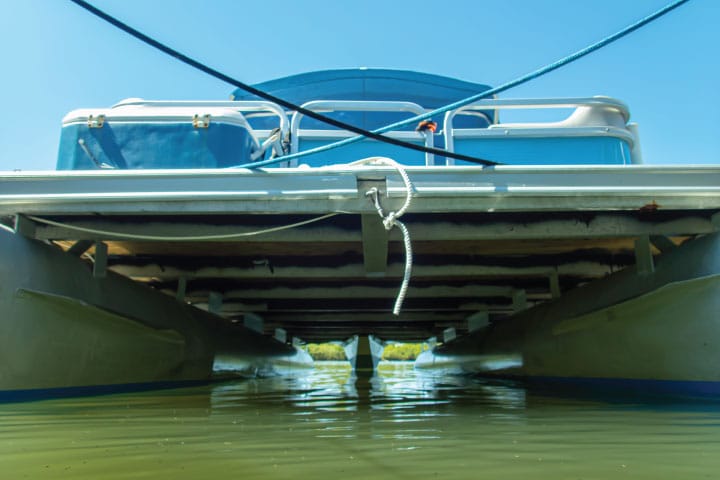
Tritoon vs. pontoon cost
At this point, you’ve probably noticed that tritoons have a lot of advantages, right? And, you probably suspect that most people would prefer to have a tritoon if it weren’t for one pesky detail: cost.
Well, you suspect right. Adding that center log can add $10,000 or more to the cost of a pontoon boat. And on top of that, if you take advantage of the ability to get a larger engine— something most tritoon buyers will want to do— the cost goes up even more.
Remember that jump from 200- to 300-hp? Take it, and you may be spending yet another $5,000 to $10,000. Many builders will also charge extra for optional performance features, driving the price tag of a fully featured tritoon even higher.
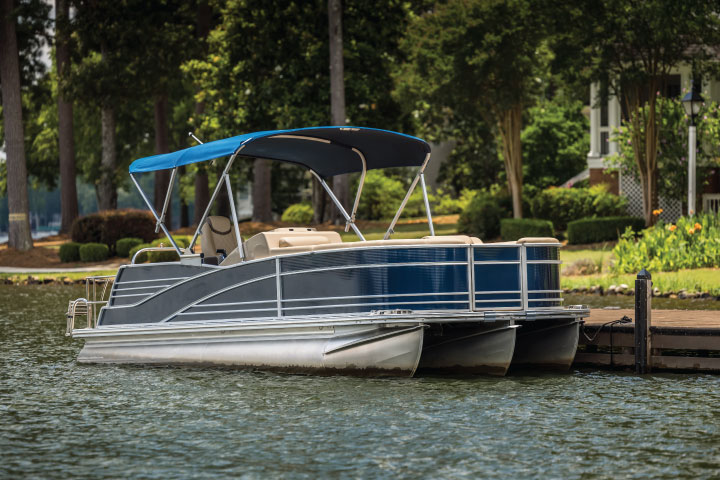
Tritoon vs. pontoon: Which is the best for you?
For folks who plan to go for mellow cruises, pull the kids around on inflatable tubes, or do their boating on small lakes and protected waterways, a pontoon will probably work out great, and there’s no need to spend the extra money to get a tritoon.
But if you want to blast across the water at fast speeds, try serious watersports, or take on rougher seas, a tritoon will win out every time. Budgetary constraints are, of course, usually a determining factor.
If you’ve discovered you enjoy the boating lifestyle but aren’t sure just yet what sorts of activities you like best or where you’ll do your boating, the smart move is to rent a pontoon boat a few times and get a feel for what activities you find the most fun.
About us
Boatsetter is a unique boat-sharing platform that gives everyone — whether you own a boat or you’re just renting — the chance to experience life on the water. You can list a boat, book a boat, or make money as a captain.
List. Rent. Earn— Only at Boatsetter

With over three decades of experience in marine journalism, Lenny Rudow has contributed to dozens of boating and fishing publications and websites ranging from BoatU.S. Magazine to BDOutdoors.com. Rudow is currently the Angler in Chief at Rudow’s FishTalk, he is a past president of Boating Writers International (BWI), a graduate of the Westlawn School of Yacht Design, and has won numerous BWI and OWAA writing awards.
